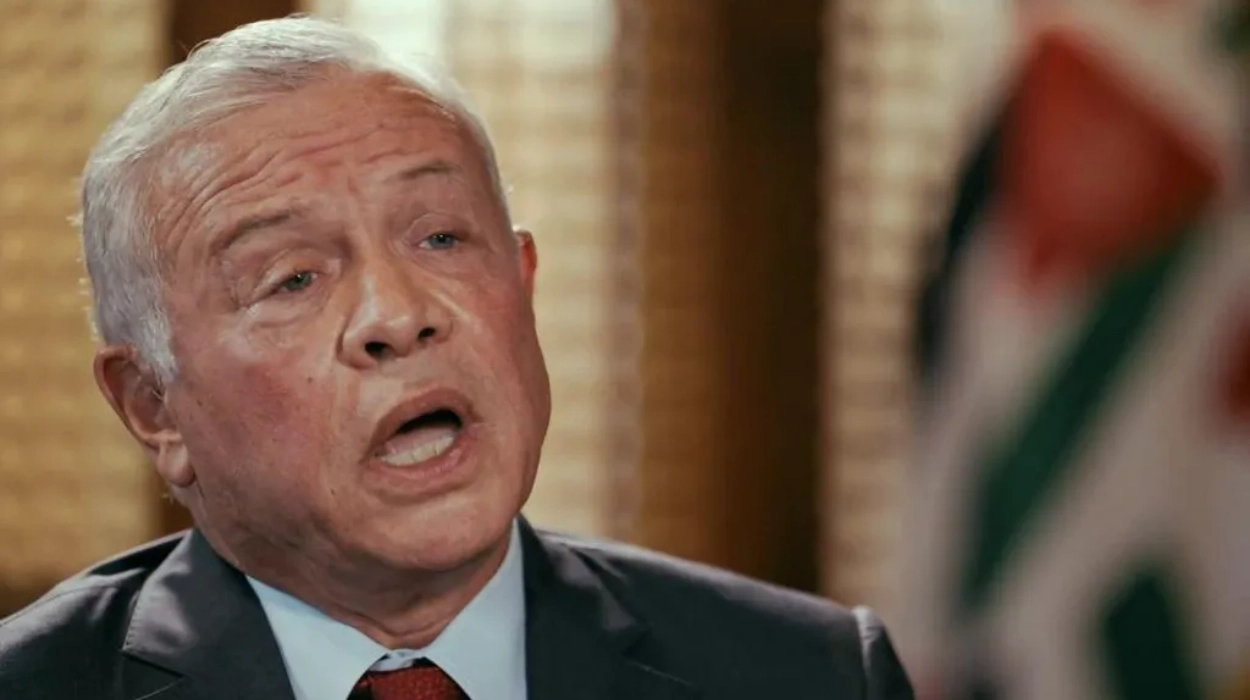Jordan (Parliament Politics Magazine) – Jordan King Abdullah II of Jordan warned that the Middle East faces a bleak future without a peace process leading to an independent Palestinian state. He emphasised that a two-state solution is the sole viable path to lasting peace amid deep regional conflicts.
King Abdullah’s Warning on the Middle East’s Future
In an exclusive interview with BBC Panorama, King Abdullah II of Jordan issued a stark warning about the fate of the Middle East, asserting that without a comprehensive peace initiative culminating in a Palestinian state, the entire region is “doomed.” The King spoke ahead of a key summit in Sharm el-Sheikh, Egypt, which focuses on implementing President Donald Trump’s 20-point peace proposal for the region. The timing is significant as it coincides with Hamas releasing its final hostages held in Gaza as part of a broader ceasefire effort.
King Abdullah stressed, “If we don’t address this issue, if we don’t create a future for both Israelis and Palestinians and foster a relationship between the Arab and Muslim nations and Israel, we are on a path to disaster.” His comments highlight impatience with decades of failed peace attempts and underline the urgent need for political vision in resolving the conflict (As reported by the BBC).
The Two-State Solution as the Only Feasible Option
The King characterised the two-state solution establishing an independent Palestinian state alongside Israel—as the only realistic way forward. He lamented the lack of progress toward this goal, blaming Israel for dismissing the concept. At the recent United Nations General Assembly, Israeli Prime Minister Benjamin Netanyahu opposed the two-state idea, a position the King criticised sharply.
“The reality is they had a Palestinian state in Gaza,” King Abdullah remarked. “What did they do with it? Did they pursue peace or coexistence? No. They launched unprovoked attacks against us, fired rockets into our cities, killed our children, and turned Gaza into a base for terror from which they executed the October 7 massacre.” This reference to Hamas-led attacks from two years ago marks a significant moment that escalated the current Gaza conflict (BBC Panorama).
President Trump’s Role and Regional Summit
King Abdullah recounted a meeting at the UN where President Donald Trump convened him and other regional leaders. “The message he conveyed to us was clear: ‘This must end. It must end now.’ And we responded, ‘Mr. President, if anyone can achieve this, it’s you,’” the King said. The summit in Sharm el-Sheikh is viewed as a crucial attempt to break the longstanding deadlock, emphasising the Trump administration’s continued involvement in the peace process.
The King underlined that progress must extend beyond Gaza, stating, “This issue extends beyond Gaza and involves a broader political landscape. He [Trump] is aiming for peace across the entire region, which cannot be achieved without a future for the Palestinians.”
Regional Tensions and Risks of Wider Conflict
Reflecting on the past two years of violence, including heightened Israeli-Iran tensions and recent Israeli strikes on Hamas leaders in Qatar, King Abdullah posed a grave question: “How close have we come to a regional conflict, or a divide between north and south, that could engulf the entire world?” This statement highlights the fragility of the situation and the potential for escalation into a larger regional war.
Despite expressing distrust in Netanyahu’s rhetoric, the King expressed hope that other Israeli leaders remain open to dialogue. He also shared that Hamas has agreed, as part of ceasefire negotiations, to hand over governance of Gaza to an independent Palestinian authority, a move currently supported by Qatar and Egypt, which are closely involved in the talks (BBC Panorama).
Historical Context and Jordan’s Role
Jordan has maintained a peace treaty with Israel since 1994, an agreement forged under King Abdullah’s father, the late King Hussein, and Israel’s late Prime Minister Yitzhak Rabin. Despite opposition within Jordan, where over half the population is of Palestinian origin, the treaty has been a cornerstone of relative stability.
When asked whether he believed a final peace agreement including a Palestinian state would be reached in his lifetime, King Abdullah responded earnestly, “I must believe it, because the alternative could signify the end of the region.” He recalled his father’s hopes for peace to benefit future generations, pondering the tragedy if children were to grow up with the same despair his father once expressed.
“This belief is what drives me and many others in the region; peace is the only path forward. If it doesn’t materialise, how often will the West, particularly America, be drawn into this conflict? It has been 80 years, and it is time for all of us to declare enough is enough” (As reported by BBC Panorama).
Human Cost of the Conflict
The health ministry in Gaza, controlled by Hamas, reports that over 67,000 people have died as a result of Israeli military operations since October 7, 2023. This immense human toll underscores the urgency of achieving peace and preventing further devastation.
Historical Overview of Israeli-Palestinian Conflict (Context)
The Israeli-Palestinian conflict is one of the longest and most complex conflicts globally, with origins extending back over a century. Prior to 1948, the territory known as Palestine was under British control following the Ottoman Empire’s collapse after World War I. The region was home to mainly Arabs with a Jewish minority. The 1947 UN plan proposed partitioning Palestine into Jewish and Arab states, which Arab nations rejected.
The 1948 Arab-Israeli War led to the creation of Israel and the displacement of approximately 750,000 Palestinians, an event known as the Nakba (catastrophe) by Palestinians. The Six-Day War in 1967 further shaped the conflict, with Israel occupying the West Bank, Gaza, and East Jerusalem. These historical events have entrenched deep grievances and territorial disputes that remain central to the conflict today (As explained by the BBC News).


